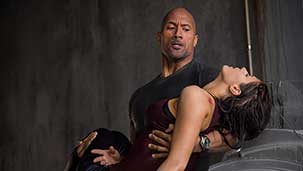The term “blockbuster” has always been rooted in violence. Originating from aerial bombs dropped during World War II, the word was officially adopted by the media in the 70s (after Jaws) to describe a massive “hit” at the box-office. But the “blockbuster” has now become quite literal. Studios decided at some point in the past few years that the secret formula for what sells has been hiding in plain sight all along: bust the block.
There’s just one problem. A tiny moral quandary that filmmakers need to deal with when creating earth-shattering images at the center of a city: 9/11.
In reverence to that day, it has become de rigueur to complain about the dismissive way innocent bystanders, like you, are killed in blockbusters. As each new superhero movie grows in scale, so too does the collateral damage. Buildings and entire cities are frequently leveled with little or no consequence. The epidemic arguably reached an apex in 2013 with Star Trek Into Darkness and Man of Steel. That’s when the accusations of appropriating images from September 11th really started to fly. How could they? What a cheap way to entertain an audience!
Recently, movies like Godzilla, Pacific Rim and Avengers: Age of Ultron have at least tried to appease movie-goers with references to how and where the public could hide during the super-sized battles. This gives the audience license to enjoy the wild destruction without that pang of guilt from worrying that someone might actually get hurt. And I won’t lie – it did help me enjoy those films.
Then along comes San Andreas. An earthquake that rocks the entire West Coast of California, and there’s nowhere to hide. No one is safe. And even more interestingly, there’s also no one to blame. In a dark and thrilling way, it’s actually a thing of beauty.
I’m tired of every big blockbuster being held hostage by the memory “that day”. And most importantly, when I watch all the people like you being killed in wild and disturbing ways (crushed by debris, falling off buildings, swept away by gushing waters), I’m actually reminded of the countless times this has happened around the word – from Haiti to Nepal to Indonesia. Natural disasters are becoming the wars of our times. It’s a fight where there is no tangible villain and everyone is a victim. There’s something powerful and unifying about that.
I could go on about San Andreas’ horribly on-the-nose dialogue, or the eye-rolling shots of sexy eye candy, or underused side-stories. But I would be lying to say that I wasn’t sufficiently enraptured by the massive spectacle on display (no, not just “The Rock”) to overlook these minor grievances. In fact, I was surprised at just how little Dwayne Johnson is given a chance to flex his muscles in the film. He spends much of his time in a cockpit rather than in the trenches. But scaling down his heroics somehow helped ground the film, too.
So, is it insensitive of me to have taken so much pleasure in your nameless demise? Does my seeing you as a stand in for thousands of people who have suffered around the world make the film more moving, more relevant, or more shamelessly entertaining? I’m not entirely sure, but seeing average people die did make me feel closer to the action. And that’s all I want really want in a blockbuster.
Sincerely,

Christopher







